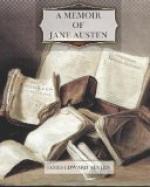{136a} A greater genius than my aunt shared with her the imputation of being commonplace. Lockhart, speaking of the low estimation in which Scott’s conversational powers were held in the literary and scientific society of Edinburgh, says: ’I think the epithet most in vogue concerning it was “commonplace."’ He adds, however, that one of the most eminent of that society was of a different opinion, who, when some glib youth chanced to echo in his hearing the consolatory tenet of local mediocrity, answered quietly, “I have the misfortune to think differently from you—in my humble opinion Walter Scott’s sense is a still more wonderful thing than his genius.”—Lockhart’s Life of Scott, vol. iv. chap. v.
{136b} The late Mr. R. H. Cheney.
{140} Lockhart had supposed that this article had been written by Scott, because it exactly accorded with the opinions which Scott had often been heard to express, but he learned afterwards that it had been written by Whately; and Lockhart, who became the Editor of the Quarterly, must have had the means of knowing the truth. (See Lockhart’s Life of Sir Walter Scott, vol. v. p. 158.) I remember that, at the time when the review came out, it was reported in Oxford that Whately had written the article at the request of the lady whom he afterwards married.
{142} In transcribing this passage I have taken the liberty so far to correct it as to spell her name properly with an ‘e.’
{145} Incidentally she had received high praise in Lord Macaulay’s Review of Madame D’Arblay’s Works in the ‘Edinburgh.’
{146} Life of Sir J. Mackintosh, vol. ii. p. 472.
{149} Lockhart’s Life of Scott, vol. vi. chap. vii.
{159} The Fowles, of Kintbury, in Berkshire.
{161a} It seems that her young correspondent, after dating from his home, had been so superfluous as to state in his letter that he was returned home, and thus to have drawn on himself this banter.
{161b} The road by which many Winchester boys returned home ran close to Chawton Cottage.
{161c} There was, though it exists no longer, a pond close to Chawton Cottage, at the junction of the Winchester and Gosport roads.
{162} Mr. Digweed, who conveyed the letters to and from Chawton, was the gentleman named in page[22], as renting the old manor-house and the large farm at Steventon.
{167} This cancelled chapter is now printed, in compliance with the requests addressed to me from several quarters.
{169a} Miss Bigg’s nephew, the present Sir William Heathcote, of Hursley.
{169b} Her brother Henry, who had been ordained late in life.
{171} The writer was at that time under twelve years old.
{173} It was the corner house in College Street, at the entrance to Commoners.



